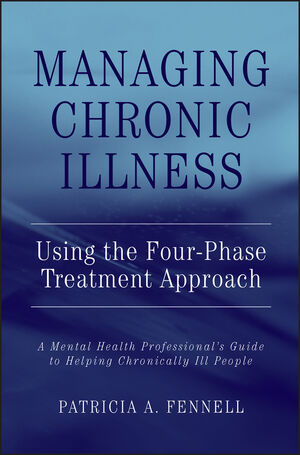Managing Chronic Illness Using the Four-Phase Treatment Approach: A Mental Health Professional's Guide to Helping Chronically Ill PeopleISBN: 978-0-471-46277-4
Hardcover
464 pages
October 2003
 |
||||||
Preface xi
Part I Conceptual Overview
1 A New Model for Treating the Chronically Ill 3
Necessary Paradigm Shifts 4
The Four-Phase Model and Other Phase Theories 5
Underlying Assumptions of the Model 13
Conceptual Dichotomies 16
The Phenomenon of Chronicity 23
Traumatization of the Chronically Ill 28
The Integration Assumption 35
Palliation 35
Patient and Clinician Together 36
2 The Cultural Context of Chronic Illness 39
The Primary Cultural Context: The Health Care System 39
Levels of Discourse 47
Sociocultural Inf luences in Chronic Illness and Their Traumagenic Effects 59
Potentially Traumagenic Sociocultural Factors 60
3 Introduction to the Four Phases: Betty’s Story 73
A Note on Developmental Life Processes 73
Betty’s Story 74
Part II The Four Phases
4 Phase 1: Crisis 97
Identifying Phase 1 Patients 99
Assessment: Physical/Behavioral Domain 105
Assessment: Psychological Domain 113
Assessment: Social/Interactive Domain 118
Clinical Goal and Treatment Issues in Phase 1 121
Treatment: Physical/Behavioral Domain 122
Treatment: Psychological Domain 130
Treatment: Social/Interactive Domain 149
Countertransference 160
Transformative Steps over the Four Phases 162
Countertransference in Phase 1 164
Clinical Stance in Phase 1 170
Spiritual/Philosophical Perspective in Phase 1 174
5 Phase 2: Stabilization 181
Personal Energy Process and Activity Categories 181
Identifying Phase 2 Patients 186
Assessment: Physical/Behavioral Domain 192
Assessment: Psychological Domain 196
Assessment: Social/Interactive Domain 199
Clinical Goal and Treatment Issues in Phase 2 206
Treatment: Physical/Behavioral Domain 207
Treatment: Psychological Domain 216
Treatment: Social/Interactive Domain 229
Countertransference in Phase 2 239
Transformation Steps in Phase 2 243
Clinical Stance in Phase 2 244
Spiritual/Philosophical Perspective in Phase 2 247
6 Phase 3: Resolution 253
Development of Meaning 253
Identifying Phase 3 Patients 256
Assessment: Physical/Behavioral Domain 263
Assessment: Psychological Domain 268
Assessment: Social/Interactive Domain 269
Clinical Goal and Treatment Issues in Phase 3 273
Treatment: Physical/Behavioral Domain 274
Treatment: Psychological Domain 276
Treatment: Social/Interactive Domain 294
Countertransference in Phase 3 298
Transformation Steps in Phase 3 301
Clinical Stance in Phase 3 303
Spiritual/Philosophical Perspective in Phase 3 304
7 Phase 4: Integration 315
Identifying Phase 4 Patients 316
Assessment: Physical/Behavioral Domain 322
Assessment: Psychological Domain 323
Assessment: Social/Interactive Domain 325
Clinical Goal and Treatment Issues in Phase 4 329
Treatment: Physical/Behavioral Domain 329
Treatment: Psychological Domain 331
Treatment: Social/Interactive Domain 335
Countertransference in Phase 4 337
Transformation Steps in Phase 4 338
Clinical Stance in Phase 4 340
Spiritual/Philosophical Perspective in Phase 4 341
Part III Future Directions
8 A Paradigm Shift 347
Chronicity and Ambiguity 347
Systems Inclusiveness 347
Distinctive Features of the Four-Phase Model 348
Umbrella Paradigm 351
Cyclic Pattern of Chronic Illness 353
Conceptual Dichotomies 354
Ongoing Trauma 357
Countertransference 358
Necessity for Teamwork 361
Meaning Development 362
Public Policy and Chronic Illness 363
Research Considerations 364
Bibliography 379
Author Index 415
Subject Index 425



